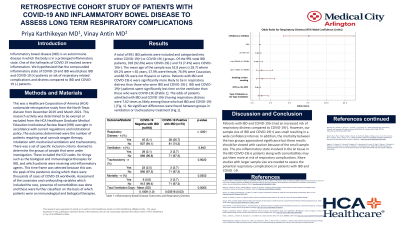Monday Poster Session
Category: IBD
P2136 - Retrospective Cohort Study of Patients With COVID-19 and Inflammatory Bowel Disease to Assess Long Term Respiratory Complications
Monday, October 23, 2023
10:30 AM - 4:15 PM PT
Location: Exhibit Hall

Has Audio
- PK
Priya Karthikeyan, MD
HCA Medical City Arlington
Arlington, TX
Presenting Author(s)
Priya Karthikeyan, MD1, Vinay Antin, MD2
1HCA Medical City Arlington, Arlington, TX; 2HCA Medical City North Hills, North Richland Hills, TX
Introduction: Inflammatory bowel disease (IBD) is an autoimmune disease in which the body is in a prolonged inflammatory state. One of the hallmarks of COVID 19 involves severe inflammation. We hypothesized that the compounded inflammatory state of COVID-19 and IBD would place IBD and COVID-19 (+) patients at risk of respiratory related complications and distress compared to IBD and COVID-19 (-) patients.
Methods: A retrospective chart review from 12/2019 to 03/2021 included patients admitted to the hospital with IBD between ages 18 – 89 years. Patients were excluded if they had a prior history of COVID-19 or were experiencing COVID-19 symptoms but tested negative with rapid and PCR testing. The data was analyzed using either t-test, chi squared, Fisher’s exact tests, and multiple regression analysis as applicable with a p ≤ 0.05.
Results: A total of 991 IBD patients were included and categorized into either COVID-19(+) or COVID-19(-) groups. Of the 991 total IBD patients, 918 (92.6%) were COVID-19(-) and 73 (7.4%) were COVID-19(+). The mean age of the sample was 52.8 years (±18.7) where 69.2% were < 65 years, 57.9% were female, 76.9% were Caucasian, and 88.5% were not Hispanic or Latino. Patients with IBD and COVID-19(+) were significantly more likely to be in respiratory distress than those who were IBD and COVID-19(-). IBD and COVID-19(+) patients spent significantly less time on the ventilator than those who were COVID-19(-)(Table 1). The odds of patients admitted with IBD and COVID-19(+) having respiratory distress were 7.62 times as likely among those who had IBD and COVID-19(-) (Fig. 1). No significant differences were found between groups in ventilation or tracheostomy treatment (Fig.1).
Discussion: Patients with IBD and COVID-19(+) had an increased risk of respiratory distress compared to COVID-19(-). However, our sample size of IBD and COVID-19(+) was small resulting in a wide confidence interval. In addition, the mortality between the two groups approached significance but these results should be viewed with caution because of the small sample size. The pro-inflammatory state involved in the GI tissue in IBD COVID-19(+) patient along with comorbidities may put them more at risk of respiratory complications. More studies with larger sample size are needed to assess the potential respiratory complications in patients with IBD and COVID -19.

Disclosures:
Priya Karthikeyan, MD1, Vinay Antin, MD2. P2136 - Retrospective Cohort Study of Patients With COVID-19 and Inflammatory Bowel Disease to Assess Long Term Respiratory Complications, ACG 2023 Annual Scientific Meeting Abstracts. Vancouver, BC, Canada: American College of Gastroenterology.
1HCA Medical City Arlington, Arlington, TX; 2HCA Medical City North Hills, North Richland Hills, TX
Introduction: Inflammatory bowel disease (IBD) is an autoimmune disease in which the body is in a prolonged inflammatory state. One of the hallmarks of COVID 19 involves severe inflammation. We hypothesized that the compounded inflammatory state of COVID-19 and IBD would place IBD and COVID-19 (+) patients at risk of respiratory related complications and distress compared to IBD and COVID-19 (-) patients.
Methods: A retrospective chart review from 12/2019 to 03/2021 included patients admitted to the hospital with IBD between ages 18 – 89 years. Patients were excluded if they had a prior history of COVID-19 or were experiencing COVID-19 symptoms but tested negative with rapid and PCR testing. The data was analyzed using either t-test, chi squared, Fisher’s exact tests, and multiple regression analysis as applicable with a p ≤ 0.05.
Results: A total of 991 IBD patients were included and categorized into either COVID-19(+) or COVID-19(-) groups. Of the 991 total IBD patients, 918 (92.6%) were COVID-19(-) and 73 (7.4%) were COVID-19(+). The mean age of the sample was 52.8 years (±18.7) where 69.2% were < 65 years, 57.9% were female, 76.9% were Caucasian, and 88.5% were not Hispanic or Latino. Patients with IBD and COVID-19(+) were significantly more likely to be in respiratory distress than those who were IBD and COVID-19(-). IBD and COVID-19(+) patients spent significantly less time on the ventilator than those who were COVID-19(-)(Table 1). The odds of patients admitted with IBD and COVID-19(+) having respiratory distress were 7.62 times as likely among those who had IBD and COVID-19(-) (Fig. 1). No significant differences were found between groups in ventilation or tracheostomy treatment (Fig.1).
Discussion: Patients with IBD and COVID-19(+) had an increased risk of respiratory distress compared to COVID-19(-). However, our sample size of IBD and COVID-19(+) was small resulting in a wide confidence interval. In addition, the mortality between the two groups approached significance but these results should be viewed with caution because of the small sample size. The pro-inflammatory state involved in the GI tissue in IBD COVID-19(+) patient along with comorbidities may put them more at risk of respiratory complications. More studies with larger sample size are needed to assess the potential respiratory complications in patients with IBD and COVID -19.

Figure: Odds Ratio for Respiratory Distress (95% Wald Confidence Limits)
Disclosures:
Priya Karthikeyan indicated no relevant financial relationships.
Vinay Antin indicated no relevant financial relationships.
Priya Karthikeyan, MD1, Vinay Antin, MD2. P2136 - Retrospective Cohort Study of Patients With COVID-19 and Inflammatory Bowel Disease to Assess Long Term Respiratory Complications, ACG 2023 Annual Scientific Meeting Abstracts. Vancouver, BC, Canada: American College of Gastroenterology.
